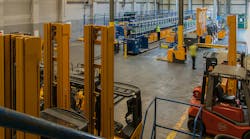Unemployment and the jobless recovery have become front-page issues. This is especially the case in manufacturing. The stock market is solidly in bull-market pastures and the profit expectations and performance of thousands of companies suggest that a parade is in order. Unfortunately, there seem to be fewer and fewer people in a marching mood. Depends on who you read, but the country has lost, shed, exported or automated away several million manufacturing jobs in the past few years. What's going on in American manufacturing?
Some of these changes are part of the globalization of the whole business system, as I noted in a previous column. And, indeed, there is always "structural" unemployment as each phase of new technologies and products is invented and developed. Automation and modern production systems do that -- inevitably.
Just as inevitably, new kinds of work are created in the form of new job definitions. A "software engineer" or "vice president of information" would not have been meaningful job descriptions some decades ago. Yet, even these factors don't explain the seemingly precipitous drop and migration of industrial work in the past few years. What else is going on?
According to the National Association of Manufacturers (NAM), the truth is a matter of costs. Yes, we have lost several million manufacturing jobs -- and the plants that they worked in -- to lower cost climates. But the NAM study notes that it is not direct-labor, wages-per-hour costs that have eroded our manufacturing base in recent years.
"External, non-production costs" are the main causes for the massive exodus of manufacturing from our shores, says Jerry Jasinowski, NAM president. These external costs include corporate tax rates, employee benefits, tort litigation, regulatory compliance and energy. Jasinowski notes that these costs are far higher for domestic producers than even the most "green" of European countries.
Needless to say, some of these costs are almost zero in some developing countries. China, for example, is not known for its abundance of pollution control regulations or its abundance of lawyers. Japan is a far less litigious country than we are, and the only endangered species in some countries is the citizenry.
These external costs, according to the NAM study, add about 22 percent, or about $5 per hour, to overall production costs. Even the country's phenomenal rise in industrial productivity, up 54 percent from 1990, cannot make up the difference, and so it's off to the Far East and elsewhere. What's the proper policy here for all of us free enterprisers? Do we just go back to the farms? Do we all go to law school?
Or, as more and more are suggesting, do we go the protectionist route and wall up what's left of the nation's factories? After all, many of our most important trading partners have taken that route. This is an election year and a growing number of Americans will be calling for new laws to stem the exodus of manufacturing to other countries.
There's another way, the NAM study suggests. Why not level the playing field? Why not adjust those external cost differentials? How? Well, clearly we can try to lighten the burden on industry in terms of tax relief and regulatory reform. In an election year like this one, however, that might be politically difficult. But here's another route. Why should China, India, Taiwan, Japan and much of Europe be allowed to get away with polluting our planet? If you've been to these countries, you know what I mean.
I know some of you will say I'm being a chauvinist about all of this. Why didn't we sign on with the Kyoto Treaty and vote for the Greenpeace agenda? Radicalism on either side of environmental issues should be condemned, and that includes the nearly complete lack of pollution control in other countries.
So shouldn't our government put pressure on theirs to clean up their industrial acts like we have? Now here is a global issue we can all unite on. We are fast becoming downright antiseptic in terms of industry. Why should we stand by while the rest of the manufacturing world gets away with befouling the air and water -- and sucking out more and more of our manufacturing jobs and investment? Something to talk about the next time you meet with a politician.
The NAM study, "How Structural Costs Imposed on U.S. Manufacturers Harm Workers and Threaten Competitiveness," was published in December. I'm sure NAM would be delighted to send copies to your favorite politicians.


